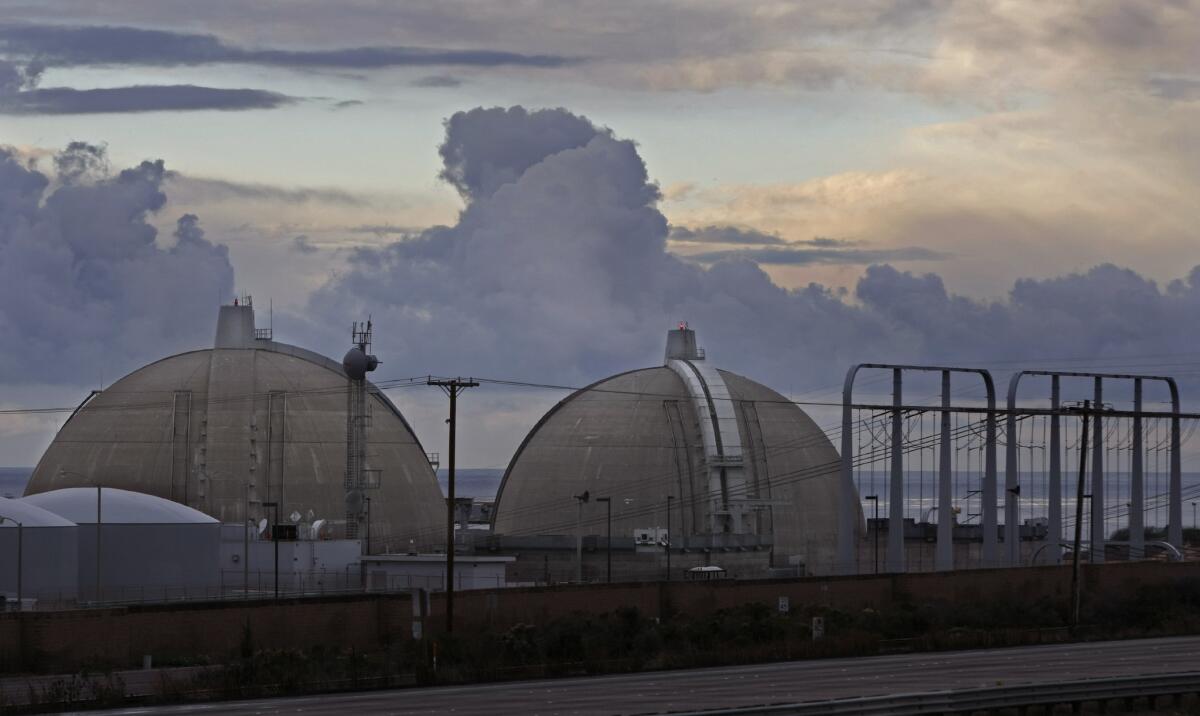Ex-PUC chief Michael Peevey’s talks with UCLA are investigated

A UCLA administrator and former Public Utilities Commission President Michael Peevey discussed the possibility of the PUC supporting research with funding from a proposed $4.7-billion settlement over the cost of permanently closing the San Onofre nuclear power plant, above, according to emails released by the university.
Reporting from Sacramento — Federal investigators probing the activities of former Public Utilities Commission President Michael Peevey have been talking to a UCLA administrator about possible PUC money being spent for energy-related research.
Stephanie Pincetl, the director of the California Center for Sustainable Communities at UCLA, said Wednesday the investigators wanted to know about a 2013 discussion of a possible PUC grant to help provide money for an academic UCLA center that has yet to be created.
“I got a call from a federal investigator about three weeks ago,” Pincetl said. “They wanted to know if I’d talked to Mr. Peevey about proposed research to mitigate greenhouse gas emissions.”
Peevey’s activities at the PUC have come under a microscope in the last six months as federal and state investigators say they are probing possible improper communications, bribery, obstruction of justice and other alleged crimes. Peevey, who left the commission in December after two six-year terms, has denied any wrongdoing.
Details of the UCLA discussions are spelled out in emails released by the university under the California Public Records Act. They confirmed that Peevey met with Pincetl in December 2013.
Pincetl’s center works with engineers, researchers and other academics from throughout the UC system. It studies land use, transportation and environmenal issues.
According to emails, Pincetl and Peevey discussed the possibility of supporting research with millions of dollars from a proposed $4.7-billion settlement over the cost of permanently closing the San Onofre nuclear power plant.
They explored the possibility of establishing an “Energy Data Center.”
In a Jan. 9, 2014, email, Pincetl suggested scheduling a meeting “to strategize how best to create this entity and how it would be funded.”
The same batch of emails indicated that Peevey was offered and accepted a seat on the board of advisors of the UCLA Luskin Center for Innovation.
The possible funding for UCLA is the second controversy involving the University of California and Peevey in the last two months.
A Feb. 12 gala dinner honoring his December retirement from the PUC stirred protests directed toward UC Berkeley’s Goldman School of Public Policy. The school was designated to receive about $30,000 in contributions from the dinner.
Faced with negative publicity, the school’s dean refused the money, and Peevey resigned from the Goldman advisory board.
Critics said the timing of the UCLA discussions is the latest evidence that detailed discussions about San Onofre closing costs were underway more than a year before a settlement agreement was finalized and publicly released.
During that time, other parties to the legal proceeding were not privy to the arrangement, leaving ratepayer, consumer and anti-nuclear-power advocates with little or no say over how nearly $5 billion would be spent.
Such one-sided deal-making violates PUC rules against improper communications between regulators and regulated power companies.
The idea of using $25 million in utility money to support energy research emerged in the final San Onofre PUC settlement, but there is no specific mention of UCLA. No decision has been made about which campus might receive all or part of the settlement money.
Twitter: @MarcLifsher
More to Read
Inside the business of entertainment
The Wide Shot brings you news, analysis and insights on everything from streaming wars to production — and what it all means for the future.
You may occasionally receive promotional content from the Los Angeles Times.











